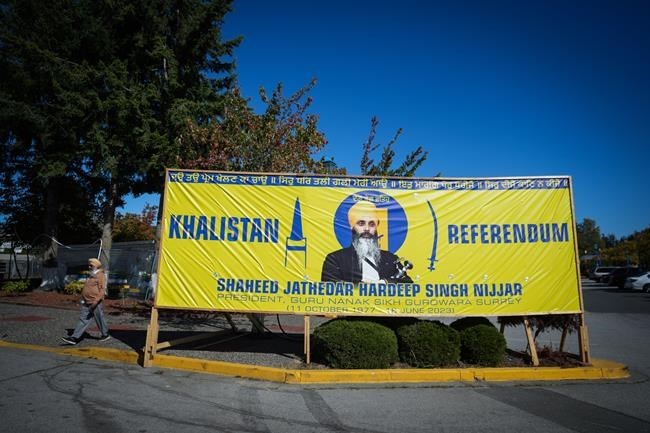WASHINGTON — The U.S. government said it has spoken to Indian authorities about allegations of a foiled assassination plot targeting a U.S.-Canadian citizen, and it expected anyone deemed responsible to be "held accountable."
The alleged target of the plot, Sikh activist Gurpatwant Singh Pannun, saidin a statement on Wednesday that he is not focusing on threats to his life, and instead is pushing forward with a separatist vote scheduled for January in San Francisco.
U.S. National Security Council spokeswoman Adrienne Watson said in a statement that Washington is "treating the issue with utmost seriousness" and raised it with the "senior-most" levels of India's government.
"Based on discussion with senior U.S. government officials, we understand the Indian government is further investigating this issue and will have more to say about it in the coming days," Watson said in the statement.
"We have conveyed our expectation that anyone deemed responsible should be held accountable.”
Watson also said Indian officials expressed "surprise and concern" and told the Americans that such activities were not their policy.
The High Commission did not return messages seeking comment on the allegations.
The statement from the National Security Council comes in response to a report in the Financial Times alleging U.S. authorities thwarted a plan to assassinate Pannun on American soil,and alleged that India's government may have been involved.
The report comes after the shooting death in June of Hardeep Singh Nijjar, a gurdwara leader in Surrey, B.C., who was also a key activist in the Sikh separatist movement.
India had previously accused Nijjar of being linked to terrorism, but it has denied involvement in his death.
Prime Minister Justin Trudeau said in September that there were "credible allegations" linking Nijjar's killing to India's government.
Speaking in response to the alleged plot against Pannun, Trudeau said Canada continues to work with allies in engaging India on the case.
"We hope that India will continue to take these real concerns seriously," he said.
Pannun, who is general counsel for the group Sikhs for Justice, confirmed he is a dual Canada-U. S. citizen and said he believes the Indian government may be targeting him because of his role in organizing referendum votes.
"The foiled attempt on my life on American soil by the Indian agents is transnational terrorism, which is a threat to the U.S. sovereignty, freedom of speech and democracy, so I will let the U.S. government respond to this threat," he said in the statement.
Pannun said his group will "continue to campaign for liberation of Punjab from the Indian occupation" and a vote is scheduled in San Francisco on Jan. 28.
Trudeau's comments in September triggered months of diplomatic tensions between Canada and India, with both sides expelling each other's diplomats and the Indian government imposing a visa ban on Canadians.
Those bans began to ease last month, and the High Commission of India in Ottawa said on social media that Canadians could apply online again for tourist visas to India as of Wednesday.
Pannun has been organizing a series of Sikh separatist votes in Canada and the United States, and was in British Columbia as recently as late October when a Sikh gurdwara hosted the second round of a non-binding referendum on the establishment of Khalistan — an independent Sikh state within India.
Both Nijjar and Pannun had been key in organizing referendums in overseas Sikh communities and in Canada in a bid to drum up support for the separatist movement.
Earlier this month, Canadian authorities said they are investigating what they called "threats" against Air India after online videos surfaced of Pannun warning people not to fly on the airline on Nov. 19.
Pannun said previously that the video was a call to boycott the airline, and no threat was made.
He has also said Nijjar's death in June had galvanized people in the overseas Sikh community to vote in the referendums as well as speak up on what he describes as "foreign interference" from the Indian government in Canada.
A 2005 Canadian government report concluded that the 1985 Air India bombings that killed 331 people were carried out as a result of a conspiracy by Sikh separatists that was "planned and executed" in Canada.
Only one man, bomb maker Inderjit Singh Reyat, was ever convicted.
— By Chuck Chiang in Vancouver
This report by The Canadian Press was first published Nov. 22, 2023.
The Canadian Press


